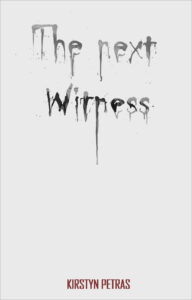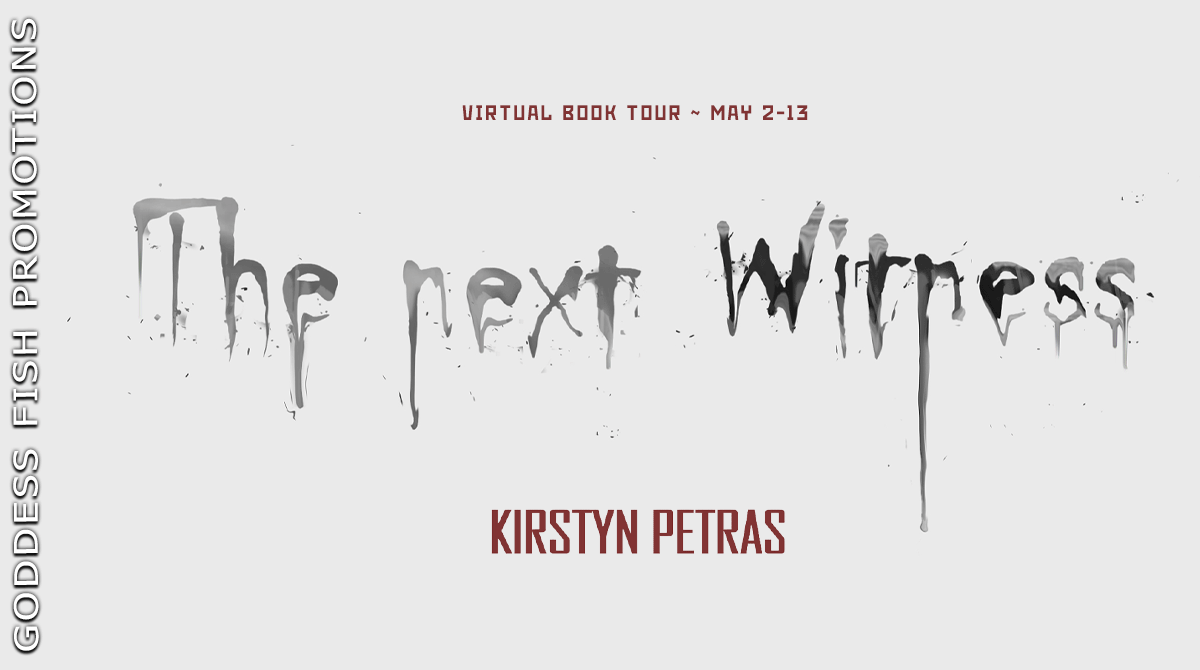 Today’s guest author is Kirstyn Petras to chat with me about her new political thriller, The Next Witness.
Today’s guest author is Kirstyn Petras to chat with me about her new political thriller, The Next Witness.
During her virtual book tour, Kirstyn will be awarding a $10 Amazon or Barnes and Noble (winner’s choice) gift card to a lucky randomly drawn winner. To be entered for a chance to win, use the form below. To increase your chances of winning, feel free to visit her other tour stops and enter there, too!
Bio:
Kirstyn Petras is a New York-based fiction writer but primarily identifies as caffeine in a human suit held together by hair spray and sheer force of will. She has been published in Punk Noir, Hoosier Noir, and by City Lights Theatre Company. When not writing, she trains contortion and aerial hoop. She is also the co-host of Dark Waters, a literary podcast exploring all that is dark, dreary, and wonderfully twisted. The Next Witness is her debut novel.
Welcome, Kirstyn. Please tell us about your current release.
The Next Witness is a political thriller.
Alexander Covington is hunting a traitor: Melody Karsh, a missing girl accused of treason, a Party member who has forsaken her country. But, letters are appearing in mailboxes, being slipped beneath doors, and in the pockets of passersby. “Free Melody” is being spray painted on walls. Her image – cold, shivering, pathetic – has captured the public’s attention and sympathy.
Melody has no idea that her name is being used to start a movement, not until the executions of those demanding her freedom start airing on television.
Derek Lin would feel sympathy, if he didn’t blame Melody for the deaths of those who have disappeared without a trace, caught up in the investigation to find her.
Melody must choose to join the fight or stand aside. Derek will become a leader or break under the pressure. Alexander will decide how many bodies must fall to save his own life.
What inspired you to write this book?
So the novel was initially inspired by my AP US History class when I was a junior in high school. I think one of the things that people don’t really get about the US education system is how much of, not just world history and the effects of US action abroad, but how much of our own domestic history is left out until students reach the upper levels of high school. Hell, there have been cases of students in Tulsa who didn’t know what the Tulsa massacre was until college. So you have this moment of, if you’re open to it, a pivotal shift in the understanding of what American ideology and philosophy really encompasses. I think my way of processing that as a teenager was to take that idea to its extreme – this dystopian society that involved the erasure of history. Then I spent the next decade reworking and rewriting and learning and growing and allowing that initial plot thread to develop into the story it is now.
Excerpt from The Next Witness:
He released his foot from the man’s hand, watching disdainfully as his men half carried, half dragged the man away. He started to follow, but out of the corner of his eye he saw something that made him pause. He turned around and saw someone staring at him with large brown eyes completely devoid of any expression. The bottom half of the face was covered in a black and white scarf, and the hair was covered with a black knit cap. By the slight curve of the body, he guessed it was a girl hiding under the layers of baggy clothing. Then his eyes traveled down, and he saw the gun in their hand.
Pointed directly at his heart.
His brain stopped.
But then there was a yell from behind the person, and she whipped around, going to the aid of one of her fellow terrorists. She was pointing the gun at someone else.
Alexander felt himself stumble back, as though her looking away had released him from a spell. He should have had more bravery. He should’ve been able to move, to react, do something. But that look, beyond cold, had shaken him in a way he couldn’t quite describe.
He needed to get out of here, and away from whoever that was. And, he added a mental note, he needed to ask whoever they’d just taken in, just how many Party members they’d corrupted, or how many people Karsh had taught to use a gun.
What exciting project are you working on next?
Currently I’m working on a story that’s more speculative/magical realism. It revolves around former best friends April and Priscilla, a bartender named Jack, their former teacher Scott, and a couple in the early 1900s with a child of questionable parentage. It’s still in the first draft, but when all’s said and done will involve a road trip from Indiana to Arizona, a motorcycle chase scene, and lots of blues music.
 When did you first consider yourself a writer?
When did you first consider yourself a writer?
I don’t know, and to an extent sometimes have a hard time identifying myself as a writer without feeling like someone’s going to come down and say “nope, actually, we take that back.” I think having some time between getting my first short story published and getting the contract for the book with Cinnabar Moth was when saying “I’m a writer” didn’t feel weird.
Do you write full-time? If so, what’s your work day like? If not, what do you do other than write and how do you find time to write?
Writing is not my full time job, but is a primary component of both my job and my creative aspirations. I would love to say I have a balance between the two, but I don’t. And there are so many other things in my life I love doing – I train aerial circus and contortion, I love baking, I love experimenting with cocktail recipes and am attempting to relearn guitar. I want time to read and time to write and time for the podcast I cohost, Dark Waters. It’s not so much a balance as trying my best.
What would you say is your interesting writing quirk?
One thing I’ve found in all of my writing is the tendency to flash backwards and forwards in time. Blending timelines into the narrative in a way that the reader doesn’t ever have a clear picture of what truly happened until the end, or possibly ever. I like letting readers figure out the story as it goes, just like the characters do.
As a child, what did you want to be when you grew up?
I shifted a lot. I suffered from the “anywhere but here,” mentality. Actress, marine biologist, hotel owner, and politician were all on the list at one point or another during my childhood. I knew I wanted to travel, and I wanted to do something that flexed creative muscles. Aside from that, the picture changed quite often.
Writing was always included, but as a dream, and in conjunction with, other aspirations.
Anything additional you want to share with the readers?
There is no secret to being a writer. Let yourself mess up. Destroy drafts, turn your desk into a pile of crumpled paper. It doesn’t have to be anything other than authentic.
Links:
Publisher | Twitter | Instagram

